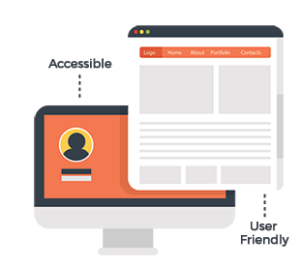 You may have heard that you need to make your website accessible for AODA compliance (The Accessibility for Ontarians with Disabilities Act). Web accessibility obligations came into effect under AODA on January 1, 2014.
You may have heard that you need to make your website accessible for AODA compliance (The Accessibility for Ontarians with Disabilities Act). Web accessibility obligations came into effect under AODA on January 1, 2014.
Web Accessibility makes the web usable for everyone. It removes barriers for those with limited mobility, learning disabilities, hearing disabilities, those who are colorblind, have low vision and seizure disorders. Even if you aren’t required under the legislation, making your website accessible is the right thing to do.
Knowing is half the battle, but implementing the necessary changes for a more inclusive web experience can seem daunting. However, you’re hurting yourself if your website isn’t accessible to those with disabilities. Accessibility in web design means creating websites and applications that everyone can use, regardless of hardware, software, or any sensory or physical impairment.
In other words
Website accessibility is about making sure everyone can use your website, including people with disabilities like vision impairment and mobility limitations. The web plays such a key role in many aspects of life, such as education, employment, government, shopping, health care and recreation, it makes perfect sense to make sure your website is accessible.
It’s incumbent upon you as a webmaster to make your website accessible for color blind people, who cannot see or use a mouse and visitors whose primary language is not your language. People with disabilities also use special assistive software or hardware to access the Web.
Does WordPress take accessibility seriously?
WordPress developers take web accessibility very seriously. WordPress’ Accessibility team has an official WordPress accessibility blog.
On June 26th, The WordPress Accessibility Team members were at WordCamp Europe to teach WordPress theme developers and reviewers the process of testing WordPress themes for the accessibility-ready tag.
WordPress supports accessibility and you can find a lot of plugins and themes to create accessibility-ready WordPress themes and websites from scratch.
AODA
The Accessibility for Ontarians with Disabilities Act (AODA) became law on June 13th, 2005. This legislation ensures that people with disabilities have equal access to the necessities of society. By January 1, 2021, all internet websites must conform with WCAG 2.0 Level AA.
WCAG
The Web Content Accessibility Guidelines (WCAG) are the recommendations written by the World Wide Web Consortium (W3C). W3C is the organization that creates HTML and CSS standards.
ARIA
Accessible Rich Internet Applications (ARIA for short) is a detailed description published by W3C that describes how to increase the accessibility of dynamic web pages that use technologies such as Ajax, JavaScript, and similar technologies. Developers often include ARIA attributes to HTML elements in order to ensure that dynamic pages are accessible.
What Makes a Website Accessible
Here is a quick list of the bare necessities which any web developer in Toronto can help you with:
- Your code needs to semantic, meaning that HTML elements need to correctly represent the website’s content.
- Images need alt tags.
- Links need appropriate and descriptive names.
- Colours need to have enough contrast for persons with colour blindness.
- Forms in particular need correct labels and input HTML elements.
- Use appropriate ARIA tags when content is dynamic.
In Conclusion
In this day and age, having access to the internet and its content has become a necessity. For example, rent signs have become a thing of the past and many job applications are completely online. People who are disabled should not have to deal with more obstacles.
We all benefit when we make our websites accessible, which means making websites accessible is never a burden or an afterthought at Simplistics, it is a source of joy knowing that it makes the world a better place.
I hope now you will be able to make accessibility-ready websites with WordPress. If you need some help to make your website accessible, contact us to help you out!

Leave A Comment
You must be logged in to post a comment.